This can be a hot topic because people of different backgrounds and age groups differ heavily on how each president is remembered. Moreso, with each new president, former presidents are remembered somewhat differently. For that matter, there are criteria for judging presidents.
Korea has a relatively short democratic history and an even shorter "real" democratic background. In just sixty years, there have been over 200 major political parties come and go. Also, one of the obstacles democracy faces in Asia stems from long-standing authoritarian tradition. Add to the mix Korea's not-that-far-behind agrarian and colonized history and you've got a recipe for political instability. But, far from impossible, many politicians have been up to the task. According to Kim, democratic Presidents have three fundamental, sequential tasks while in office. The third can't successfully be obtained without the second, and the second can't exist without the first:
- national security (internal, external war)
- economic welfare (infrastructure development, public services)
- political development (freedom, individual rights)
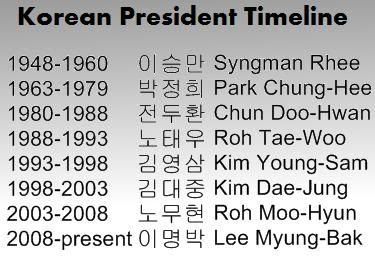
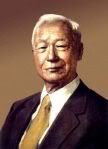
이승만 - 1948-1960
Syngman Rhee held a provisional post before the creation of what we today know as South Korea. Although he succeeded the popular and tragic political figure 김구, Rhee was quite accomplished in his own right and was an obvious candidate for the newly created Republic of Korea. As a young politician, he was a political prisoner for seven years before being released. He is best known as the first president of Korea and for carrying the country during the Korean War. His fresh new ideas and staunch anti-communist platform came at a crucial time in Korea. His relationship with the United States was vital to American involvement in the war. In addition, his academic career was equally impressive. Graduating from both Princetown and Harvard is not a bad thing to add to one's résumé. Although he was democratically elected, he altered the constitution to remain in office quite a bit longer than the usual seven year term (now five year single term). In addition, after successfully leading South Korea before, during, and after the war, his politics soon fell out of favor was eventually forced to step down by a sweeping majority and subsequent student uprising. He lived the rest of his life in exile and died in Hawaii five years later.
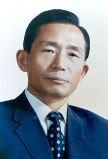
박정희 - 1963-1979
Park Chung-Hee took power in 1961 in the form of a military coup. He held much more power than 윤보선, the figurehead president who took over after Rhee's departure. A former general, Park ruled with an iron fist and a well-defined agenda. His anti-North Korean stance was well received; he believed that the best way to demonstrate superiority and security from North Korea was through economic strength. Thus, his main policy was economic independence through exports and heavy industry. Park is fondly remembered for his well-executed economic reform. His policies helped modernize Korea into better shape than before the war that left it in a state of poverty. Unfortunately, his presidency is equally remembered as authoritarian and heavy-handed. His censorship tactics were brutal and often inhumane. He left little room for professional criticism and democratic thought. His Yushin Constitution led Korea in a war-like state of emergency which granted Park with excessive political power. He survived two North Korean assassination attempts, one in 1968 and another in 1974. The second attempt missed the president but instead hit the first lady. His wife passed shortly thereafter. Regrettably, Park was assassinated in 1979 by the head of the Korean CIA. His legacy has often been the subject of great controversy.
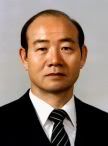
전두환 - 1980-1988
Chun Doo-Hwan seized power from the former prime minister who became president after Park's death. Like Park, Chun was a military general who ruled with a similar economic agenda as Park but with a focus on stability instead instead of growth. He also spearheaded a major advancement in research and development in the fields of technology and telecommunications. He is pleasantly remembered for his role in hosting the 1988 Seoul Olympics. This event eventually had the support of the entire country and resulted in numerous infrastructure improvements such as the Han River Development Project and the 88 Olympic Expressway. Although not as physically imposing like his predecessor, Chun had big shoes to fill but still held his position effectively. He improved Korea-Japan international relations and repeatedly stressed that he would step down once his single-term was up. However, like Park, he was the target of an assassination plot that went sour and sadly resulted in the death of his wife and several other officials. Most unfortunately, he was among a group of politicians who were held responsible for the military's brutal role in the Gwangju Democratization Movement (also known as the Gwangju Uprising). This event is still regarded as the most tragic lose of civilian life in Korea since the Korean War. After his term, it was discovered that Chun and his family had embezzled hundreds of millions of dollars while in office. In addition, in 1996 he was found guilty and sentenced to death for his role in suppressing the Gwangju Uprising. He was later pardoned and has since been out of the political limelight.
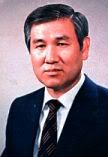
노태우 - 1988-1993
Roh Tae-Woo succeeded his mentor and close friend, Chun. They were both high school friends and eventually served together in an elite paramilitary force. His temperament was decidedly cooler than his predecessors. During a particularly violent student riot in June of 1987, Roh, then just a presidential candidate, addressed the nation on national television with an eight point agenda to fix the country. Almost immediately, the rioting ceased. Unfortunately, the arranged election time for the National Assembly coincided with an unfavorable time for the government and resulted in the dissident minority party gaining a majority of seats. What did this mean for Roh? His legislative goals were stopped at the National Assembly floor because they came from the other party. Ouch. Also, he was not particularly interested in the economy, a policy that the Korean people had long been expected to be maintained. However, Roh was greatly interested in improving relations with North Korea. His Nordpolitik was achieved via trade relations with Beijing and Moscow. Although he promised a lot in his campaign to a lot of different people, he reported carried a black notebook around and once quoted from it when questioned about his effectiveness "I made a total of 459 promises...of these...a total of 175 have been completed and [an additional] 273 are in the process of being worked out." Even though Roh was the first president to usher in a peaceful democratic transfer of power since 1948, both Roh and Chun were of the same political party and the legitimacy of the handoff has long been questioned. Also, like his predecessor, he was found guilty of accumulating a 650 million dollar massively illegal slush fund and was sentenced to 22.5 years in prison. He was later pardoned but his legacy was forever tarnished.
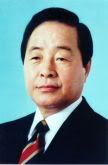
김영삼 - 1993-1998
Kim Young-Sam came into the political scene as a young and ambitious dissident. At 25 years old, he was the youngest elected assemblyman to ever serve in the National Assembly. A dynamic man, prior to becoming President, he was put under a two year house arrest and then went on a 23 day hunger strike in protest of President Chun's policies. Stricken with 대통병 (President disease) he soon set his sights on the office of the President. He would be come the first civilian president in thirty-two years. He charged to create a new Korea although he lacked any real administrative experience. Also, his cabinet appointments were less than qualified to lead the country. If that weren't enough, he "borrowed too many brains" by frequently reshuffling cabinet members. Stressing mass political reform, he led by example; he swore off golf, replaced fancy Blue House meals with simple dishes, and ordered the Presidential guest villa to be demolished. At the peak of his popularity, he pushed a new open and transparent banking system that relied on real names. This act resulted in over 1000 public officials throughout the country resigning from their post or forcibly sent to prison for various related illegal activities. His anti-corruption campaign spread to the military further forcing resignations from another 1000 or so officers in addition to revealing the 142 names of the secret paramilitary force 하나회. Unfortunately, for all of his crusading, he was alarmingly inexperienced in economic matters. Instead, he pursued OECD membership. His passionate demeanor sometimes worked against him as in 1994 when North/South Korea relations were at an all time low. A thick air of mistrust and possible nuclear war was on the brink until a joint North/South meeting was arranged with former American president Jimmy Carter as mediator. In fact, a historical North/South summit was set to take place July 25th 1994, but North Korean leader 김일성 died on the 9th. Regardless, Kim's economic negligence came to an apex with the 1997 IMF Crisis. He stepped down as one of the most unpopular presidents.
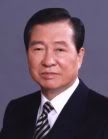
김대중 - 1998-2003
Kim Dae-Jung did not have it easy. He was placed on house arrest several times by President Park. He was imprisoned by President Chun. He was kidnapped by the KCIA in Japan and brought back to Korea. He has been referred to as the Nelson Mandela of Asia. A life-long freedom fighter, at age seventy-three, he finally became President by a skim 1.5% margin of victory over 이희창. Kim had studied and lived in the United States, an experience that served him well as President. He cleaned up the IMF mess by insisting on 재벌 (corporate) restructuring, government reorganization, and a labor/management compromise. His DJnomics shook things up all over the country with little regard for the long-term effects. Furthermore, Kim insisted that he would help break down a long standing tradition of regionalism. Most notably, his Sunshine Policy aimed at amicable trade and cultural exchanges between North and South Korea. Emotions ran high on June 13th, 2000 as Kim flew to 평양 for a historical summit meeting which resulted in a five point agreement between the two neighboring countries. For his efforts, Kim was awarded the Nobel Peace Prize. However, his popularity in Korea was quickly deteriorating as juicy scandals and ineffective policies came to light. His Sunshine Policy was angering many South Koreans as it seemed one sided tilted in North Korea's favor. In 2003, it was estimated that one out of every five families could not pay their credit card debt - a result of his short-term and short-sided economic policies. Also, his administration is widely believed to be the most corrupt in modern Korean history. He left quietly office amid serious doubts about his legacy and passed away in August of 2009.
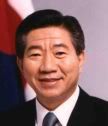
노무현 - 2003-2008
Roh Moo-Hyun - the self-made human rights lawyer who climbed his way up the political ladder. His meager upbringing and underdog political status did not exactly pave the way for his future as President. However, he was known as a man of transparent good character and an all-around upstanding citizen. At the time of his election, the public wondered if he could be as effective in the inside as President than when he was on the outside as a dissident. Roh represented the 386 generation of Koreans and promised change and reform but soon his policies were questioned. His controversial and extravagantly expensive proposal to move the capital was not well received. Roh was also quite possibly the most Anti-American President ever - coinciding with one of the most Anti-American protest movements in recent history. Overall, his job performance wasn't exactly regarded as effective, though it's far to point at that the cards were stacked against him in some ways. Regardless of his politics, he tragically shocked the nation by committing suicide this past May. His passing closes a possible chapter in Korean political history - an ex-president who could achieve more out of office (arguably much like former American President Carter) or at least live out post-Presidential life in dignity. He remains an enigma.
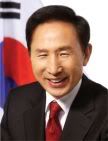
이명박 - 2008-present
Lee Myung-Bak was the former mayor of Seoul before making his mark as President. The "bulldozer" also holds the distinction of being Korea's youngest CEO at age 35, just eleven years after starting work for the Hyundai group. Recently, President Lee donated approximately 90% of his accumulated wealth to set up a scholarship fund. Well done. As mayor, 2MB initiated a rather controversial revival project that, $900 million dollars later, is known as 청계천. After his stint as mayor, he campaigned on his 747 economic plan which was met with hope and caution by the voting public. Even more skepticism was aimed at his Grand Korean Waterway - a project that would link 한강 (Han River in Seoul) and 낙동강 (Nakdong River in Busan) at great financial and environmental cost. Surprisingly, Lee recently dropped all plans of building the canal during his term. As if to really change things up around, his foreign policy, known as the MB Doctrine, is rising eyebrows on at least two continents. Furthermore, Lee has limited freedoms of assembly and press on more than a few occasions as well as having a rather extreme religious stance of both anti-Buddhist and borderline fanatically pro-Christian. He's not exactly liked by the Korean gay and lesbian community, either. President Lee is controversial and conservative at best and Korea's answer to Dubya at worst. Only less than two years into his presidency, Lee has plenty of time to make either great strides or costly mistakes.
- - - - - - - - - - - - - - - - - - -
I know that politics can sometimes seem to be about as fun as calculus, but I can't help but be fascinated with Korea's history. It's dynamic, dramatic, and riddled with broad achievements and epic failures. It shows so much promise and so much growth in such small amount of time. I'm impressed how far Korea has come politically since my grandfather's generation (Korean War). I certainly welcome any dialogue about this subject as it is of great interest to me.
Thoughts?
No comments:
Post a Comment